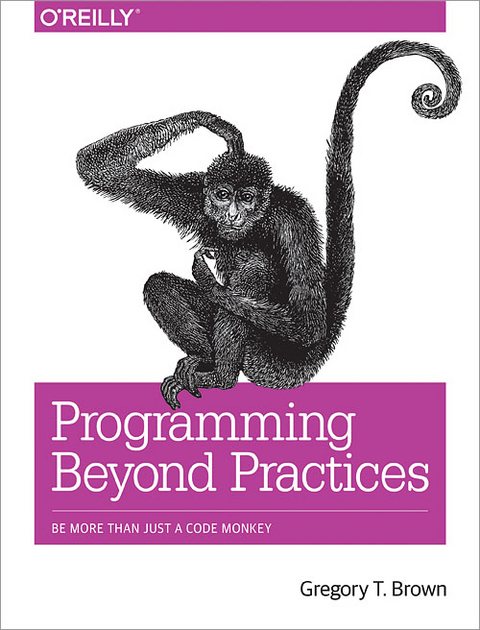
Programming Beyond Practices
O'Reilly Media (Verlag)
978-1-4919-4382-3 (ISBN)
Writing code is the easy part of your work as a software developer. This practical book lets you explore the other 90%—everything from requirements discovery and rapid prototyping to business analysis and designing for maintainability. Instead of providing neatly packaged advice from on high, author Gregory Brown presents detailed examples of the many problems developers encounter, including the thought process it takes to solve them.
He does this in an unusual and entertaining fashion by making you the main character in a series of chapter-length stories. As these stories progress, the examples become more complex, and your responsibilities increase. Together, these stories take you on a journey that will make you question and refine the way you think about, and work on, software projects.
Steps in this unique journey include:
Using prototypes to explore project ideas
Spotting hidden dependencies in incremental changes
Identifying the pain points of service integrations
Developing a rigorous approach towards problem-solving
Designing software from the bottom up
Data modeling in an imperfect world
Gradual process improvement as an antidote for over-commitment
The future of software development
Gregory Brown has run the independently published Practicing Ruby journal since 2010, and is the original author of the popular Prawn PDF generation library.In his consulting projects, Gregory has worked with key stakeholders in companies of all sizes to identify core business problems that can be solved with as little code as possible.Gregory's relentless focus on the 90% of programming work that isn't just writing code is what lead him to begin working on Programming Beyond Practices.
Chapter 1Using Prototypes to Explore Project Ideas
Start by understanding the needs behind the project
Use wireframes to set expectations about functionality
Set up a live test system as soon as you start coding
Discuss all defects, but be pragmatic about repairs
Check your assumptions early and often
Limit the scope of your work as much as possible
Remember that prototypes are not production systems
Design features that make collecting feedback easy
Chapter 2Spotting Hidden Dependencies in Incremental Changes
There’s no such thing as a standalone feature
If two features share a screen, they depend on each other
Avoid non-essential real-time data synchronization
Look for problems when code is reused in a new context
Chapter 3Identifying the Pain Points of Service Integrations
Plan for trouble when your needs are off the beaten path
Remember that external services might change or die
Look for outdated mocks in tests when services change
Expect maintenance headaches from poorly coded robots
Remember that there are no purely internal concerns
Chapter 4Developing a Rigorous Approach Toward Problem Solving
Begin by gathering the facts and stating them plainly
Work part of the problem by hand before writing code
Validate your input data before attempting to process it
Make use of deductive reasoning to check your work
Solve simple problems to understand more difficult ones
Chapter 5Designing Software from the Bottom Up
Identify the nouns and verbs of your problem space
Begin by implementing a minimal slice of functionality
Avoid unnecessary temporal coupling between objects
Gradually extract reusable parts and protocols
Experiment freely to discover hidden abstractions
Know where the bottom-up approach breaks down
Chapter 6Data Modeling in an Imperfect World
Decouple conceptual modeling from physical modeling
Design an explicit model for tracking data changes
Understand how Conway’s Law influences data management practices
Remember that workflow design and data modeling go hand in hand
Chapter 7Gradual Process Improvement as an Antidote for Overcommitment
Respond to unexpected failures with swiftness and safety
Identify and analyze operational bottlenecks
Pay attention to the economic tradeoffs of your work
Reduce waste by limiting work in progress
Make the whole greater than the sum of its parts
Chapter 8The Future of Software Development
| Erscheinungsdatum | 29.10.2016 |
|---|---|
| Verlagsort | Sebastopol |
| Sprache | englisch |
| Maße | 181 x 234 mm |
| Gewicht | 244 g |
| Einbandart | kartoniert |
| Themenwelt | Mathematik / Informatik ► Informatik ► Programmiersprachen / -werkzeuge |
| Mathematik / Informatik ► Informatik ► Software Entwicklung | |
| Schlagworte | Data Modeling • Softwareentwickler • Softwareentwicklung |
| ISBN-10 | 1-4919-4382-3 / 1491943823 |
| ISBN-13 | 978-1-4919-4382-3 / 9781491943823 |
| Zustand | Neuware |
| Haben Sie eine Frage zum Produkt? |
aus dem Bereich


